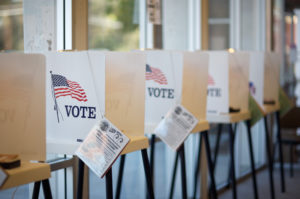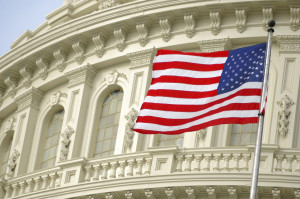
The Supreme Court blocks the Biden Administration’s vaccine rule, the FAA provides protection to 50 airports from 5G, and more…
IN THE NEWS
- In a 6-3 decision, the U.S. Supreme Court temporarily blocked the Biden Administration’s mandate that businesses with 100 or more workers require those workers to vaccinate themselves against COVID-19 or undergo weekly testing. The Court reasoned that petitioners are likely to prevail in their charge that the Biden Administration lacks the authority to impose a vaccine-or-test mandate. In their dissent, Justice Stephen Breyer, Justice Sonia Sotomayor, and Justice Elena Kagan stated that this decision “seriously misapplies the applicable legal standards” and expressed that halting the mandate “stymies the Federal Government’s ability to counter the unparalleled threat that COVID-19 poses to our Nation’s workers.” The Court, however, allowed the vaccine-or-test mandate to remain in place for workers at health care facilities that receive federal funding.
- The Federal Aviation Administration (FAA) selected 50 airports to receive protection from 5G wireless signals, which will help prevent flight disruptions. The FAA stated that wireless companies providing the new 5G service agreed to temporarily turn off 5G transmitters near airports to reduce interference with aircraft instruments used in low-visibility landings. The FAA considered factors such as location, weather patterns, current severity of 5G interference, and traffic volumes to make selections for which airports would receive protection from 5G interference.
- The U.S. Environmental Protection Agency (EPA) announced it will assess whether leaded fuel used by piston-engine aircraft causes air pollution that endangers public health. According to the agency, piston-engine aircrafts release more lead emissions than any other source. Prior to regulating pollutants or activities, the agency must issue an endangerment finding based on its study of pollutants and sources of air pollution to determine if they “threaten human health or welfare.” EPA said it will issue an endangerment finding in 2022, allowing for public comment, and plans to issue a final finding in 2023.
- France’s Ministry of Social Affairs and Health announced it will lift its ban on blood donations from men who have sex with men. The ministry, in 2020, reduced a restriction on blood donations from men who have sex with men after sexual intercourse from 12 months to 4 months. The new rule will require sexual orientation to be removed from blood donation forms and remove any post-intercourse limitations beginning on March 16. France’s former health minister Marisol Touraine said the policy works to end “taboo and discrimination.”
- EPA announced that before registering new active ingredients in pesticides, it will evaluate their impact on endangered species. The new policy, which takes effect immediately, requires EPA to consult with the U.S. Fish and Wildlife Service and the National Marine Fisheries Service on pesticides that may adversely affect endangered species or critical habitats. Assistant Administrator for EPA’s Office of Chemical Safety and Pollution Prevention Michal Freedhoff said that “protecting listed species and their habitats is essential to EPA’s mission to protect human health and the environment.”
- The Biden Administration released guidance for insurance companies to cover at-home COVID-19 tests. According to the U.S. Department of Health and Human Services (HHS), those with private health insurance can receive either prepaid at-home tests or reimbursement for tests by their health plans. The new requirement will allow people with qualifying insurance to obtain at least eight tests per month. HHS Secretary Xavier Becerra said the requirement for insurers is part of the Biden Administration’s “overall strategy” to increase access to at-home tests.
- The Louisiana Supreme Court ruled that hospitals in the state could continue to require their employees to be vaccinated against COVID-19. The court explained that the nature of the at-will employment doctrine allows hospitals to terminate employees for failure to comply with a vaccine requirement and that employees did not claim any “statutory or constitutional rights” to justify interfering with that doctrine. Warner Thomas, CEO and president of Oschner Health, the healthcare system named in the suit, said that the decision supported Oschner’s “right to enact policies that protect patients and staff.”
- The U.S. Government Accountability Office (GAO) recommended that the U.S. Internal Revenue Service (IRS) and the U.S. Department of Treasury review cryptocurrency kiosk registration requirements and require disclosure of kiosks’ locations. Cryptocurrency kiosks allow individuals to exchange money for digital currency. GAO found that virtual currency plays a growing role in human and drug trafficking. GAO reasoned that reviewing registration and reporting requirements, among other changes, will allow the IRS and Treasury Department to identify and monitor operations at high risk for illegal transactions.
WHAT WE’RE READING THIS WEEK
- In a recent Brookings Institution report, David Skeel, professor at the University of Pennsylvania Law School discussed the growing populist backlash to Chapter 11 of the bankruptcy code—the provisions allowing businesses to restructure themselves. Skeel argued that many have come to view Chapter 11 as unfairly benefiting “insiders” and “large corporations.” Skeel pointed to several elements that have contributed to the backlash such as the choice of venue rule that effectively allows a company to choose the judge that handles its case. Skeel concluded that these problems could lead Congress to enact significant reforms to bankruptcy law.
- In a recent article in the Cardozo Law Review, Raymond Shih Ray Ku, professor at Case Western University School of Law argued that pregnancy is a form of expression that should be covered by the freedom of speech provision of the First Amendment. Beyond the First Amendment’s traditional protection of the freedom of speech and press, Ku explained that the Supreme Court has expanded the definition to “protect expression and association more generally.” Ku concluded that although the First Amendment could someday be the only constitutional method with which to protect an individual’s right to choose an abortion, designating a specific constitutional right should not be necessary. Ku argued that the Constitution protects “liberty in general” and that this liberty is violated when the government forces an individual to remain pregnant.
- In a report for the Center for American Progress, Dylan Bruce, Tyler Gellasch, Todd Phillips, and Alexandra Thornton, argued that instead of relying on a third party, the U.S. Securities and Exchange Commission (SEC) should write its own environmental, social, and governance (ESG) disclosure rules, which would require public companies to disclose important information related to ESG. Bruce and his coauthors explained that challengers may raise objections about whether the SEC has the authority to appoint a third party, as opposed to a subordinate official or agency, to create ESG standards. In addition, Bruce and his coauthors argued that delegation to a third party may result in insufficient rulemaking because, for example, a third party may introduce bias into standards or limit public opportunity for comment. Bruce and his coauthors concluded that the SEC should write its own ESG standards to promote transparency and protection from systemic risk.
FLASHBACK FRIDAY
- In an essay in The Regulatory Review, Alice Kaswan, professor at the University of San Francisco School of Law, discussed the need for environmental and “social welfare advocates” to address how the transition away from fossil fuels will impact communities differently. Kaswan argued that in contrast to the traditional environmentalist approach, the environmental justice movement’s approach to balancing pollution reduction with “economic opportunities” is well-equipped to inform policies promoting the country’s shift to clean energy. She cited California’s attempts to direct revenues from its emissions trading program to underserved communities as a model of the environmental justice approach. Kaswan concluded by calling for environmental and climate justice advocates to form “real political alliances” that can prevent injustice during the transition to clean energy.



